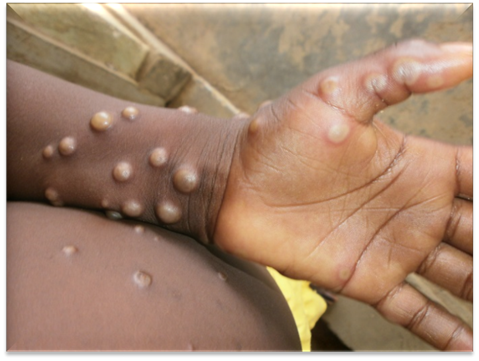By Stephen Obidike
Of recent, there has been rising cases of the Monkey Pox infection. The Director General of the World Health Organisation (WHO) declared this outbreak a public health emergency of international concern. Most cases started in the Democratic Republic of Congo, and it has since spread to other countries in Africa and Europe with about thirty-nine cases reported in Nigeria already. Although M-Pox is not new to our heath sector, the new variant has some peculiar features. It is more infective and is sexually transmitted as well.
M-Pox is caused by a Deoxyribonucleic (DNA) virus belonging to the orthopoxvirus like the Small-Pox virus. It is transmitted by close contact with persons with the virus, rats, rodents, squirrels and some wild animals that harbour the virus. Other means of transmission are coughing, sneezing, sex, kissing, cuddling, touching animals or people with the virus. It is important to cook meat, especially bush meat, and other food items well to also help limit transmission of the virus.
The illness is usually mild and runs a self-limiting course, but the new variant seems to cause more mortality than the previous strains.
Symptoms are however similar and include high temperature, feeling unwell with headache, generalised body acnes and pains, swollen glands, sore throat, poor appetite. The significant symptom is the rash which looks like the Chicken pox rash that is solitary and has a clear fluid with a scab forming after a while over the rash. It usually starts on the face and spreads to other parts of the body, starting within five days of onset on the symptoms.
Treatment is best by preventing the illness by ensuring you take necessary precautions to avoid exposure to the possible sources of the virus. Avoiding unnecessary travels, crowded areas, ensuring food and meat are cooked properly, hand hygiene, avoiding bush meat and animals that serve as reservoirs for the virus, avoiding unprotected sex.
However, if you contract the virus, it is best to avoid contact with other people close to you to limit spread. Contact your doctor with your suspicion for further evaluation and advice. High temperature can be controlled with over-the-counter medication like Paracetamol if you are not allergic to it. Keep well hydrated and take a lot of rest.
For immunosuppressed individuals, vaccination against the virus will be an advisable option to help boost immunity against the virus. The vaccine for the M-Pox is like the Smallpox virus and is available in the health system. Nigeria is currently sourcing for the vaccine and hopes to have it in the country in the next few weeks. Most importantly for this infection and most other viral infections, prevention is far better than cure.
Dr Stephen Obidike, an emergency physician and social activist, writes from the UK.

